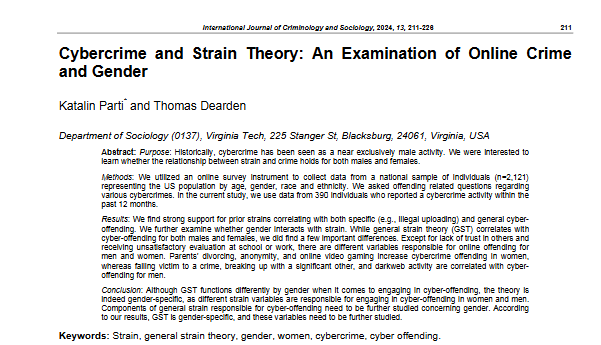By Katalin Parti, Thomas Dearden
Purpose: Historically, cybercrime has been seen as a near exclusively male activity. We were interested to learn whether the relationship between strain and crime holds for both males and females.
Methods: We utilized an online survey instrument to collect data from a national sample of individuals (n=2,121) representing the US population by age, gender, race and ethnicity. We asked offending related questions regarding various cybercrimes. In the current study, we use data from 390 individuals who reported a cybercrime activity within the past 12 months.
Results: We find strong support for prior strains correlating with both specific (e.g., illegal uploading) and general cyber-offending. We further examine whether gender interacts with strain. While general strain theory (GST) correlates with cyber-offending for both males and females, we did find a few important differences. Except for lack of trust in others and receiving unsatisfactory evaluation at school or work, there are different variables responsible for online offending for men and women. Parents’ divorcing, anonymity, and online video gaming increase cybercrime offending in women, whereas falling victim to a crime, breaking up with a significant other, and darkweb activity are correlated with cyber-offending for men.
Conclusion: Although GST functions differently by gender when it comes to engaging in cyber-offending, the theory is indeed gender-specific, as different strain variables are responsible for engaging in cyber-offending in women and men. Components of general strain responsible for cyber-offending need to be further studied concerning gender. According to our results, GST is gender-specific, and these variables need to be further studied.
International Journal of Criminology and Sociology, 13, 211–226





